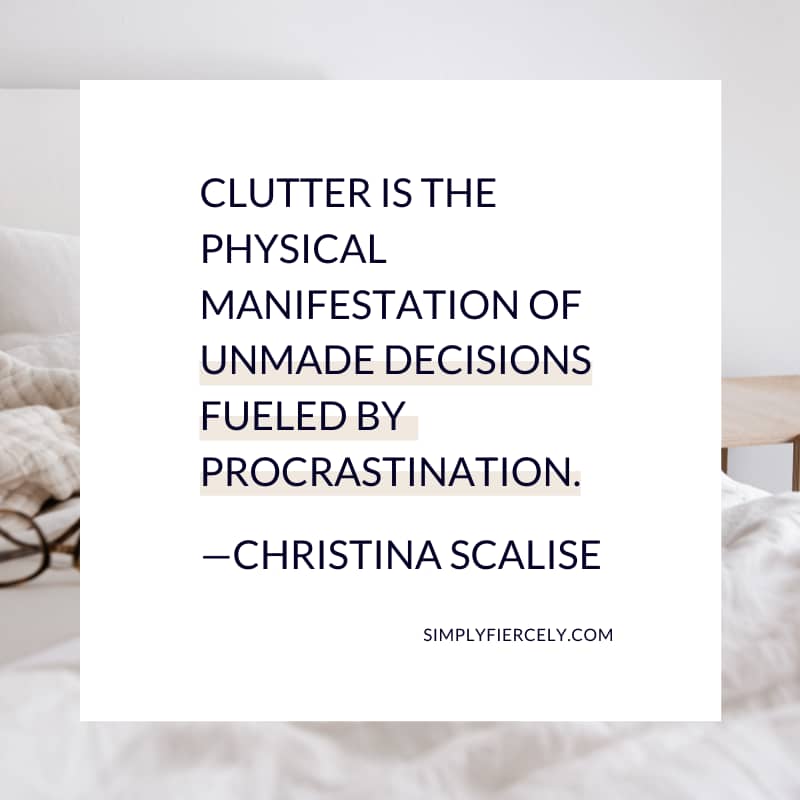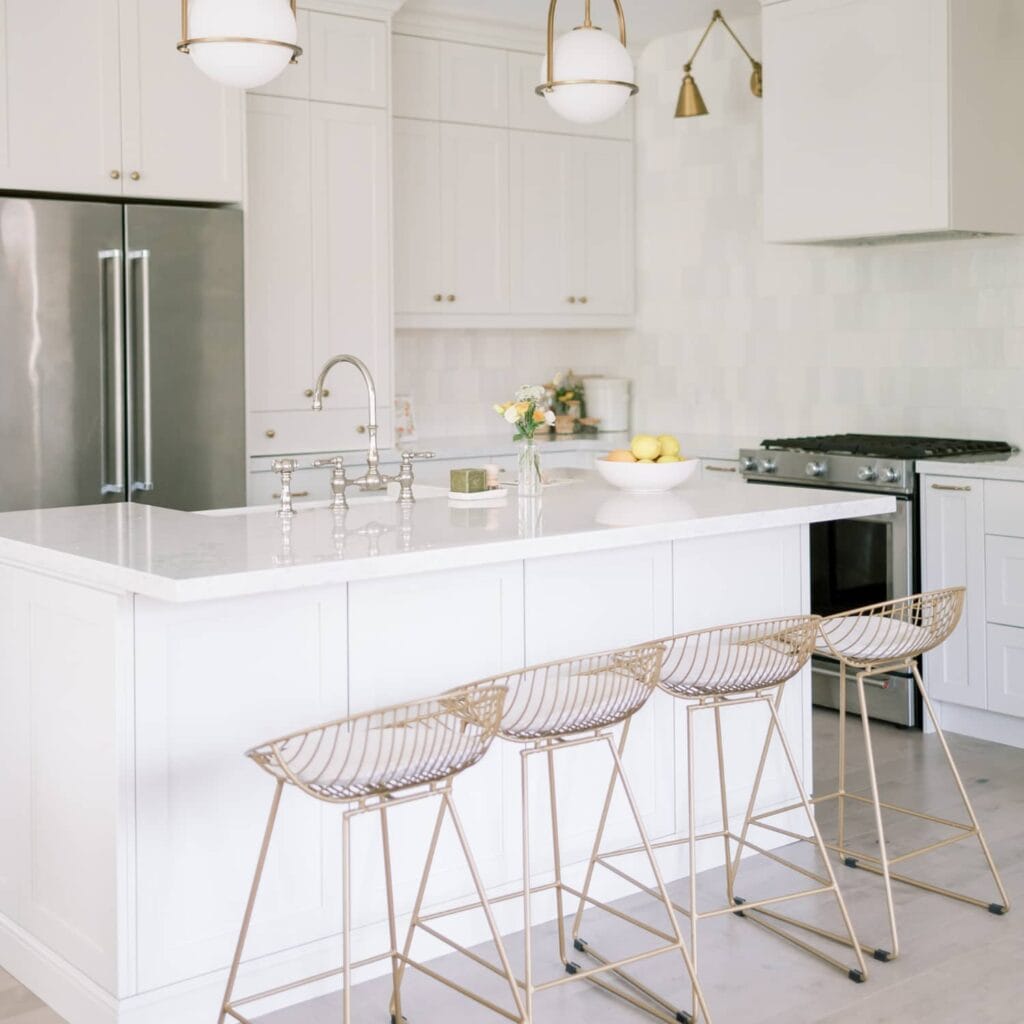Dreaming of a clutter-free home? These tried and tested tips will help you declutter and keep it that way—for good this time.
I first decluttered my home nearly a decade ago, letting go of close to 80% of what I owned. Since then, a lot has changed. I moved interstate (twice), got married, and gave birth to two beautiful children.
But throughout it all, one thing has remained the same: my clutter-free lifestyle. It’s been challenging at times, but it’s worth fighting for. Owning less has made all of these transitions easier (especially motherhood!).
If you’re wondering how to stop the clutter, here are my top ten tips for creating and maintaining a minimalist home. These have been tremendously helpful over the years, and I hope that you find them helpful too.

What Does It Mean To Be Clutter-Free?
Before I share my tips, I want to point out that living clutter-free doesn’t mean you have to give up all of your possessions. A decluttered home is not an empty home, and it doesn’t have to be boring, cold or sterile. Instead, it’s a lifestyle choice.
When you live clutter-free, you use all your things regularly, everything has its place, and you feel good about what you own. You have stuff, but it’s the “stuff” that adds value to your life.
For example, I have young children, and yes—my home is busier than it used to be. But that’s OK. We own toys, but they all get played with, and I know where every single one belongs. (So does my daughter, and she’s not afraid to tell you if you put something in the wrong place!)
I also have duplicates of items that I know I’ll use, and I’m OK with keeping some things ‘just in case’ (like craft supplies). This might go against the “rules of minimalism“, but I don’t care. It doesn’t feel cluttered because I know what enough means to me because I understand my lifestyle, and I set boundaries accordingly.
If you want a clutter-free home, then this is a great first step: thinking about what enough means for you and your family. For most, extreme decluttering isn’t realistic—but this doesn’t mean you can’t find a happy medium and enjoy the benefits of a clutter-free space.
How To Keep Clutter Away For Good
If you’ve ever wondered how to stop clutter from entering your home, here are ten simple tips that will help you.
1. Learn your clutter habits
First and foremost, you need to pay attention to your clutter habits. Where is your stuff coming from? And why are you hanging onto it?
The answer will be different for everyone, and it can take a bit of effort to figure out, but once you do, everything changes. You see your clutter with new eyes, and it’s so much easier to manage.
The best way to get answers is to look at what you’re decluttering—and then ask a few thoughtful questions.
- Where did this come from?
- What was I thinking when I bought it? (Or when you allowed it into your home?)
- Why have I kept it for so long?
- Why am I decluttering it now?
Over time, you’ll begin to notice patterns. For example, when you look at your shopping habits, you might realise that you buy things when you’re feeling stressed. Once you have this self-awareness, you can look for new, healthier ways of coping when you feel overwhelmed by life. It will save you money and help you maintain a clutter-free house.
Alternatively, you might notice that a lot of your clutter is gifts that you can’t let go of. If this is the case, you might need to have an honest conversation with loved ones or decide on a strategy for dealing with gifts ahead of time, so they don’t overwhelm you and your home.
There are a million reasons why we have clutter, and you can create a personalised strategy to stop it for good once you figure out yours.

2. Name your tradeoffs
Every time you’re tempted to bring something new into your home, I encourage you to think about the tradeoffs. What will this item cost you in the long run?
The answer is a lot more than the purchase price. There are ongoing expenses—storage, cleaning, maintenance—and don’t forget about your time and energy. (If you’ve ever wasted a weekend cleaning your garage, then you’ll know exactly what I mean!)
And what about your peace of mind? Clutter is proven to cause stress and anxiety, so think about this every time you’re tempted to add something new to your life. This isn’t to say that you should never buy anything, but when you do, make a conscious effort to think of the big picture. The value that it adds to your life should be more than what it costs you.
3. Borrow before you buy
The next time you need something, resist the impulse to hit the shops. Instead, try borrowing what you need first.
Yes, I know this takes more time in the short term, but there are always tradeoffs, as we’ve already discussed. Spending more time now might save you time later—and borrowing almost always saves money!
Ask friends and family for what you need, or get creative. In my community, we have a neighbourhood Facebook group, which has been a fantastic resource. Alternatively, many communities have organisations like tool libraries or ‘sharing sheds’ where you can borrow a wide range of goods for free or for a low monthly subscription.
4. Reduce your storage space
Every time I read an article about decluttering or home organisation, there are tips on how to increase your storage. But do you know what?
The more storage you have, the more clutter you’ll keep.
If you want to own less stuff, try decluttering storage containers or even furniture first. With fewer places to store your clutter, you’ll have no choice but to let go of a few things. It can be confronting, but I promise it works.
5. Know exactly where you’ll put something before you bring it into your home
Before you allow anything to pass through your front door, figure out exactly where you’ll put it. Do you have room in your closet or on your bookshelf? Is there space in your living room or on your kitchen counter? If not, are you prepared to give something up to make space?
Asking this simple question is an excellent gatekeeper and will help keep your home clutter-free.

6. Create a personal uniform
If you struggle with too many clothes, one simple solution is to create a personal uniform.
A personal uniform is a ‘formula’ for getting dressed. For some, it means wearing the same thing every day (think of Steve Jobs, who always wore jeans and a black turtleneck), but it doesn’t need to be so restrictive.
Instead, you might prefer a particular style—like skinny jeans and long t-shirts, for example. Pick a simple colour palette and a few favourite fabrics, and voilà! Getting dressed is a breeze. You know exactly what works for you, so you’ll never end up with clothes you never wear again.
Pro Tip: a capsule wardrobe is a great way to support your personal uniform.
7. Have a strong vision for your home
Did you know that one of the most common causes of clutter is a lack of clarity?
When you don’t know what you want or what you’re trying to achieve, it’s hard to make good decisions about what you need. The result? Too much stuff that doesn’t really matter.
The solution is a strong vision for your home. How can your space serve you? Where do you work, where do you rest, and where do you have fun? And with that in mind, what does or doesn’t belong in your home?
Also, think about your personal style. Get clear on what you genuinely enjoy versus what you only admire in others (because there’s often a big difference). The more you can clarify what you want and need, the easier it will be to see what doesn’t belong.
These simple questions will make the decluttering process easier and stop new clutter building up. It’s a win-win!
Related Post: Declutter Without Stress: 6 Simple Tips For Decluttering With Ease
8. Shop less often and appreciate what you have
Some tough love—if you have too much clutter, you’re probably shopping too much.
I know there are some exceptions, but most of the time, we’re responsible for what we bring into our homes. Trust me, as a reformed shopaholic, I know this all too well! Even if you’re not a problem shopper like I was, the little purchases add up.
The simple solution is to buy less. If this is a struggle for you, here are some resources that might help:
- 4 Reasons Why You Can’t Stop Shopping + What To Do About It — Do you find yourself in Target more often than you’d like? These simple tips can help you create new habits.
- How to Stop Online Shopping (Tips From a Former Shopaholic) — Are the roots of your piles of clutter the “add to cart” button? Check out my ultimate guide to stopping online shopping.
- How to Stop Buying Stuff You Don’t Need — A step-by-step roadmap to buying less of what you never really needed.
9. Remind yourself that everything you own, you have to clean
There’s no denying that new stuff is exciting. It’s easy to get caught up in our heads, imagining all the ways some item will make life better. These thoughts make it easy to get carried away, but I’ve found a simple way to stop them in their tracks.
Remind yourself that every single thing you own will need to be cleaned at some point.
Personally, dust is my nemesis (I have horrible allergies), so just thinking about dusting is often enough for me to veto bringing something new into my life. The less I have to dust, the happier I am!
Or if you’re shopping for clothes, pause and imagine the piles of laundry waiting for you at home.
10. Pay attention to your stress and frustrations
I know that some people advocate for constant decluttering—perhaps keeping a box of donations in their hall closet at all times—but I must admit that I’m not a massive fan of this. I want less clutter because I’m tired of wasting time and energy thinking about my stuff. Constant decluttering feels counterintuitive to me.
Instead, I keep my home clutter-free by paying attention to what brings me stress and frustration. If I’m constantly tripping over toys or I can never find my keys, these are signs that I need to simplify (and they’re clues to where I need to start decluttering). This way, my home stays clutter-free, but I’m not thinking or obsessing about stuff all the time, which is the perfect balance for me.
Reminder: The best tips and strategies are the ones that work for you
I’ve shared the tips that work best for me as someone living in a small space (660 square feet) with two young kids. But here’s an important reminder: the best tips are the ones that work for YOU.
If you’re feeling stuck or you’re struggling with a clutter block, use this post to identify a few starting points. Clear a clutter hot spot or take a few bags to a charity shop. But don’t beat yourself up trying to be perfect. That stress can be as harmful to your mental health as clutter. Practice self-kindness and work on little things every day. You’ve got this!
Need Help With Decluttering?
I hope that these tips will help you maintain a clutter-free home, but if you’re still struggling to get rid of clutter in the first place, then here are a few resources for you.
First, Mindful Decluttering—my step-by-step decluttering guide and workbook. It’s been downloaded over 20,000 times, and you can get a copy for free by subscribing below.
Next, here are some popular blogs posts about decluttering that might help you overcome your decluttering challenges:
- 8 Tips That Will Help You Find Motivation to Declutter
- 23 Decluttering Ideas That Will Create Space In Your Home + Life
- What To Do When You’re Overwhelmed By Clutter
- How to Declutter When You Regret Spending Money
Do you struggle to maintain a clutter-free home? What are your biggest challenges? Or do you have tips to share? Let us know in the comments!


Thanks for your feedback! Unfortunately, the ads are how I fund my writing (until I get a book contract one day😉😂). I appreciate your kind words. Take care!
I’ve been decluttering for some time now, after living with a 2 hoarders for many years. Life is so much simpler and my home looks so much better! When people drop by I practically beg them to come in, something I haven’t been able to do my whole adult life.
I can literally deep-clean my whole place in about an hour because everything is picked up, put away, or it’s out the door. Once I get an item in my car, it’s out of my life because I drop it by the local thrift store on my way to work. What a difference in my mental well-being!
I’ll continue to explore your site and look forward to your posts. Thank you for this.
These are all great tips!
I have to agree with keeping a declutter box though. I can toss items in there as I go about my daily life and come across things I realize I don’t need or want, rather than dedicating time to decluttering at another point. It’s maintenance for me after having significantly decluttered years ago!
I think it’s great that you know what works for you! That self-awareness is such a part of decluttering and simplifying. Thanks for reading 🙂
I downloaded your de-clutter workbook a while ago…but it’s now buried somewhere under a pile of clutter in the office. * sigh
I feel overwhelmed at the paperwork especially…I think I have Adhd and I have trouble focusing on completing tasks. Ugh
Big hugs, Terese! I know it can be hard—it took me YEARS to make any progress decluttering my life. Just remember that it’s OK to take small steps. It all adds up. Best of luck and thank you for reading.❤️
Clutter habit – never thought about it that way. Insightful idea…thanks
You’re welcome! 🙂
These are great tips! For me, some family members are always trying to be helpful with giving me and my sisters their unwanted things. There’s a way to say no thank you without being rude, because all those items really add up. Thanks for sharing!
The little things really do add up with time! Thanks for taking the time to comment Mollie 🙂